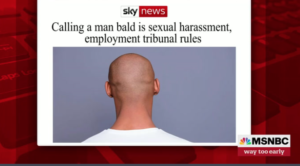One might quibble with the pretzel logic that led three judges in England to rule in favor of an employee who filed a complaint against his supervisor for calling him bald (adjacent to a much worse four-letter word), but the more interesting challenge may be rooted in the fact the judges themselves are bald. They even reflected on their own experiences in the ruling.
The panel pointed out the majority of balding humans on the planet are male (I believe the percentages are in the high 80s) and that this is equivalent to commenting on the size of a woman’s breasts.
The case involved an electrician named Tony Finn who was working on a West Yorkshire manufacturing plant and his supervisor, Jamie King. King allegedly called Finn a “bald c–t.” In an atmosphere of prevailing “industrial language,” Finn was apparently more concerned by the reference to his lack of hair than to the anatomical slur.
“It is difficult to conclude other than that Mr. King uttered those words with the purpose of violating [Finn’s] dignity and creating an intimidating, hostile, degrading, humiliating or offensive environment for him,” the judgment found. “Of his own admission, Mr King’s intention was to threaten [Finn] and to insult him. In our judgment, there is a connection between the word ‘bald’ on the one hand and the protected characteristic of sex on the other.”
The panel will announce later what compensation Finn is due for his harassment.
I am not steeped in English jurisprudence and cannot say whether this particular ruling can be appealed, but the fact the three judges on the panel were themselves bald – and hinted as much in their ruling – might be grounds for a filing as perhaps a prejudicial perspective.
“As all three members of the Tribunal will vouchsafe,” the judges wrote, “baldness is much more prevalent in men than women. We find it to be inherently related to sex. (In contrast, we accept that baldness affects (predominantly) adult males of all ages so is inherently not a characteristic of age).”
This news broke, as I previously reported, on the day I published my own story of being bald for 30 years – and then not.

